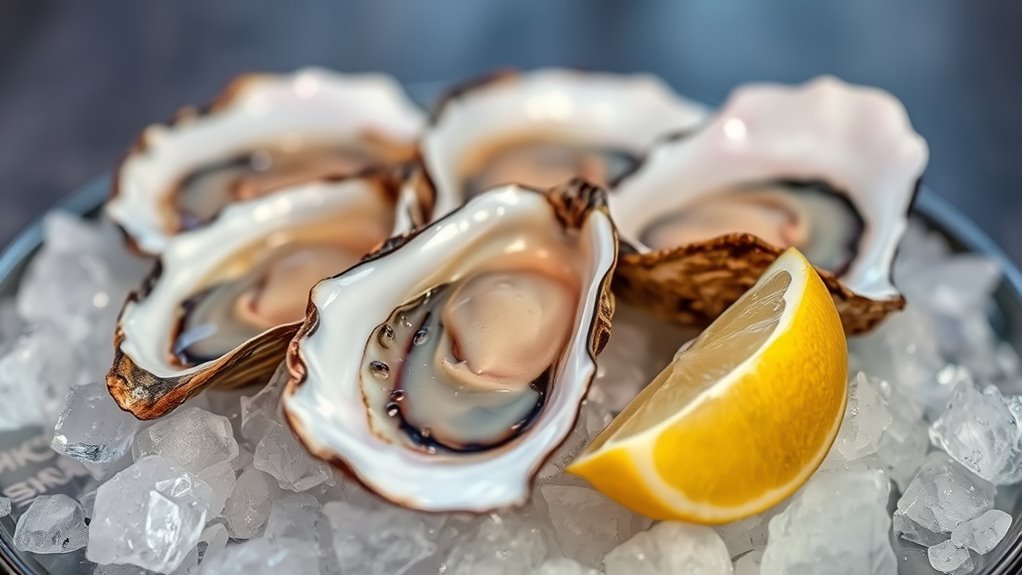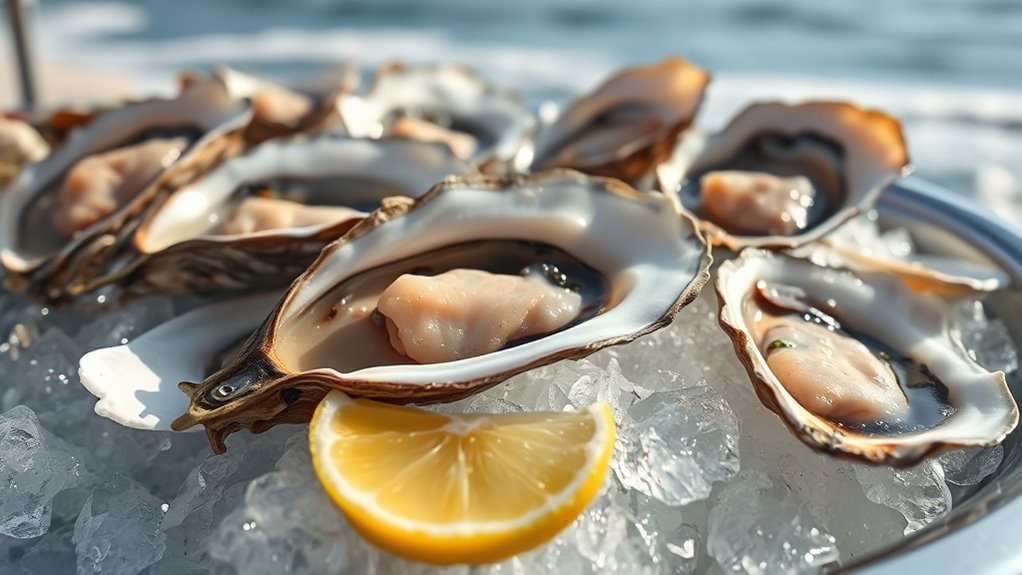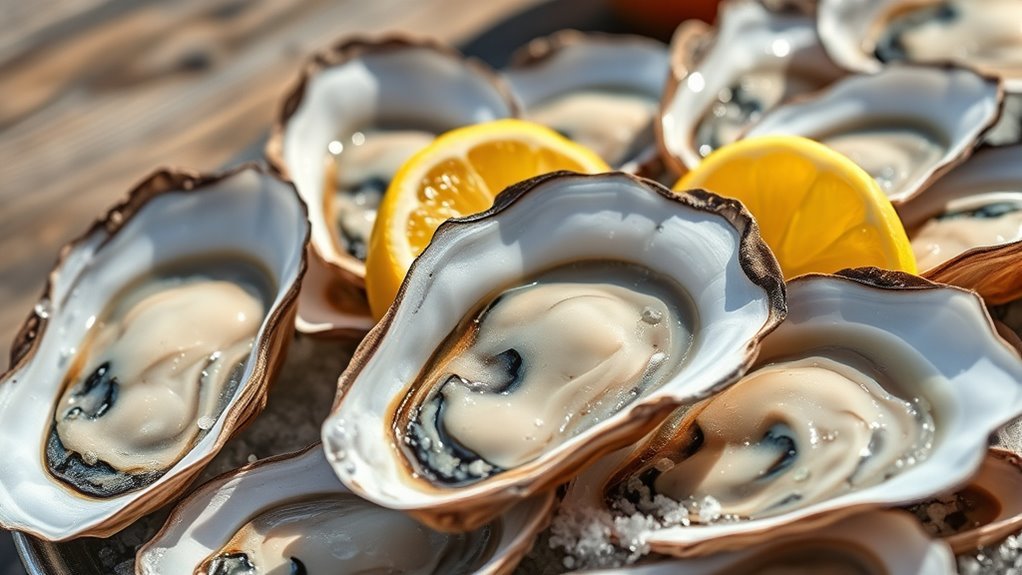Yes, oysters are definitely keto-friendly! They’re low in carbs, with about 2-5 grams per 100 grams, making them a great option for a ketogenic diet. Oysters also pack a punch with protein and healthy fats, contributing to muscle repair and overall nutrition. Plus, they offer numerous health benefits, like supporting heart and immune health. If you’re interested, you can explore various ways to enjoy oysters while sticking to your keto goals.
Understanding the Nutritional Profile of Oysters

Oysters are a nutritional powerhouse, offering a variety of essential nutrients that can fit into a keto diet. They’re rich in protein, omega-3 fatty acids, and vital vitamins and minerals like zinc and vitamin B12. This makes them an excellent choice for anyone looking to maintain a healthy lifestyle. Plus, with the rise of oyster farming, you can enjoy these benefits while supporting sustainable practices. Responsible oyster farming not only provides a steady supply of this nutrient-dense food but also promotes marine ecosystem health. By choosing sustainably farmed oysters, you’re contributing to environmental balance, ensuring that future generations can enjoy these delicacies. So go ahead, indulge in oysters, and embrace their nutritional benefits without compromising your values.
Carb Content: How Many Carbs Are in Oysters?

When considering whether oysters fit into your keto diet, it’s important to look at their carb content. A standard serving of oysters contains about 5 grams of carbohydrates, which is relatively low compared to many other seafood options. This makes them an appealing choice for those monitoring their carb intake.
Oysters Nutritional Profile
While many seafood options can fit into a ketogenic diet, understanding the nutritional profile of oysters, particularly their carbohydrate content, is essential. Oysters are low in carbs, making them an excellent choice for those pursuing a keto lifestyle. Typically, a serving of oysters contains about 3 grams of carbohydrates, allowing you to indulge without derailing your diet. Beyond their carb count, oysters offer significant health benefits, packed with protein, vitamins, and minerals. They also support sustainability, as responsible farming practices minimize environmental impact. By incorporating oysters into your meals, you not only enhance your health but also enjoy a seafood option that prioritizes ecological balance. So, embrace the freedom of choice with this nutritious and sustainable delicacy!
Carb Count Comparison
For anyone on a ketogenic diet, knowing the carb count of various foods is essential for maintaining ketosis. Oysters can be a great option, but different oyster varieties can have slightly different carb counts. Here’s a quick comparison:
- Pacific Oysters: Approximately 3 grams of carbs per 100 grams.
- Eastern Oysters: About 4 grams of carbs per 100 grams.
- Kumamoto Oysters: Roughly 2 grams of carbs per 100 grams.
- Olympia Oysters: Close to 3 grams of carbs per 100 grams.
When you look at these nutritional comparisons, you’ll see that oysters are generally low in carbs, making them a favorable choice for keto enthusiasts. Always remember, moderation and variety can help you maintain a balanced diet while enjoying the freedom of choosing delicious foods.
Health Benefits of Incorporating Oysters Into Your Diet

Incorporating oysters into your diet can offer a range of health benefits, particularly for those following a keto lifestyle. These nutrient-dense shellfish are packed with vitamins and minerals that support immune function, enhancing your body’s natural defenses. Oysters also promote heart health due to their omega-3 fatty acids, which can help reduce inflammation and improve cardiovascular function. Their high zinc content plays an essential role in skin health, keeping your complexion vibrant. Plus, the fiber found in oysters aids digestive health, ensuring a well-functioning gut. As a low-calorie food, they can assist with weight management, allowing you to enjoy flavorful meals without compromising your health goals. Embracing oysters can truly elevate your keto journey.
Oysters and Protein: A Keto-Friendly Source
If you’re looking for a protein-rich food that fits into a keto diet, oysters are a great choice. They pack a high protein content while remaining low in carbohydrates, making them ideal for maintaining ketosis. Incorporating oysters into your meals can help you meet your nutritional goals without the added carbs.
High Protein Content
Oysters stand out as a remarkable source of protein, making them an excellent choice for those following a keto diet. Not only do they support muscle recovery, but they also offer various benefits for your health. Here’s why oysters are a great protein source:
- High Protein Density: Oysters contain about 9 grams of protein per 3-ounce serving.
- Essential Amino Acids: They provide all the essential amino acids necessary for muscle repair and growth.
- Low in Calories: With their low calorie count, they fit perfectly into your keto meal plan without compromising your macros.
- Nutrient-Rich: Oysters are packed with vitamins and minerals, including zinc and vitamin B12, enhancing overall wellness.
Incorporating oysters into your diet can be a delicious way to meet your protein needs while enjoying the freedom of the keto lifestyle.
Low Carb Option
When it comes to maintaining a low-carb lifestyle, oysters shine as an outstanding choice. With minimal carbohydrates, they let you enjoy a delicious seafood option without compromising your diet. Different oyster varieties, like Pacific and Atlantic, offer unique flavors and textures, making them versatile for various dishes. Beyond being low in carbs, oysters provide significant seafood benefits, including high protein content and essential nutrients like zinc and omega-3 fatty acids. These nutrients support overall health and can enhance your keto journey by promoting satiety and nourishing your body. So, whether you’re slurping them raw or adding them to your favorite recipes, oysters are a fantastic low-carb option that aligns perfectly with your keto goals.
The Role of Fats in a Ketogenic Diet: Do Oysters Fit?
How do oysters fit into the fat-focused framework of a ketogenic diet? While oysters may not be a primary source of fats, they can still play a role in your keto journey. Here’s how they align with keto guidelines and offer fats benefits:
- Low in Carbs: Oysters contain minimal carbohydrates, helping you stay within your daily limits.
- Moderate Protein: They provide a good protein source, essential for muscle maintenance.
- Nutrient-Dense: Rich in vitamins and minerals, oysters contribute to overall health.
- Versatile: They can be paired with healthy fats, like butter or olive oil, enhancing your meals.
Incorporating oysters can complement your diet while keeping you aligned with keto principles. Enjoy the freedom of exploring diverse foods!
Cooking Methods for Keto-Friendly Oysters
Exploring different cooking methods can elevate the enjoyment of oysters while keeping them keto-friendly. Grilling oysters is a fantastic option; it enhances their natural brininess and adds a smoky flavor. Just toss them on the grill until they open, and consider adding a keto-friendly compound butter for an extra layer of richness.
Baking oysters is another delicious method. You can bake them with toppings like parmesan cheese, garlic, and herbs, creating a savory dish that fits seamlessly into your keto lifestyle. Both grilling and baking maintain the low-carb integrity of oysters, allowing you to savor these nutrient-dense delicacies without compromising your dietary goals. Enjoy experimenting with these cooking techniques!
Pairing Oysters With Other Keto Foods
While oysters are naturally low in carbs, pairing them with other keto-friendly foods can create a delightful and satisfying meal. Here are some great oyster pairings to contemplate:
- Creamy Avocado: The healthy fats from avocado complement oysters perfectly.
- Garlic Butter: A classic combination that adds richness, just be mindful of portion sizes.
- Keto Dips: Serve oysters with low-carb dips like a spicy aioli or tangy salsa verde for an extra flavor kick.
- Cheese: Soft cheeses like cream cheese or goat cheese can enhance the oysters’ briny taste.
These oyster pairings not only keep your carb count in check but also elevate your dining experience, allowing you to enjoy the freedom of delicious, keto-friendly meals.
Potential Allergies and Considerations
Although oysters are a nutritious addition to a keto diet, it’s essential to be aware of potential allergies and considerations. Many people suffer from oyster allergies or shellfish sensitivities, which can lead to serious reactions. Symptoms may include hives, nausea, or even anaphylaxis in severe cases. If you’ve had allergic reactions to other shellfish, you should approach oysters with caution. Additionally, consider any dietary restrictions or health conditions that might be impacted by shellfish consumption. If you’re unsure, consulting with a healthcare professional can help you make an informed decision. Enjoying oysters can be a delicious experience, but being mindful of these factors guarantees your keto journey remains safe and enjoyable.
Recipes to Try: Delicious Keto Oyster Dishes
If you’re looking to incorporate oysters into your keto meal plan, you’ll find that there are plenty of delicious recipes that highlight their unique flavor and nutritional benefits. Here are four dishes to try:
- Oyster Stew: A creamy, rich soup that’s perfect for a cozy night in. Use heavy cream and butter for a keto twist.
- Grilled Oysters: Top them with garlic butter and herbs, then grill for a smoky flavor that’ll impress your guests.
- Baked Oysters: Stuff with cheese, spinach, and bacon for a decadent appetizer that’s low in carbs.
- Oyster Appetizers: Serve raw with a drizzle of lemon juice and hot sauce for a revitalizing, keto-friendly starter.
These recipes not only satisfy your cravings but also keep you aligned with your keto goals. Enjoy!
Frequently Asked Questions
Can I Eat Oysters Raw on a Keto Diet?
Sure, you can enjoy raw oysters on a keto diet! They’re low in carbs and packed with nutrients. Raw oyster benefits include high levels of zinc and omega-3 fatty acids, which are great for overall health. When it comes to oyster preparation methods, you can also grill, steam, or bake them for variety. Just make sure to source them from reputable places to avoid any health risks. Enjoy your seafood freedom!
Are Canned Oysters Keto-Friendly?
Picture a treasure trove of oceanic delights when you think of canned oysters. Packed with nutrients, they’re a fantastic option for a quick meal. Canned oyster nutrition shows they’re low in carbs, making them a suitable choice for those watching their intake. You can whip up delicious canned oyster recipes, from savory stews to zesty salads, without feeling guilty. So, if you’re craving something unique, these little gems might just be your ticket!
Do Oysters Contain Any Sugars?
Oysters have minimal sugar content, making them a great choice for your diet. With regard to oyster nutrition, they’re low in carbohydrates and high in protein, which can support your health goals. Typically, they contain less than 1 gram of sugar per serving, so you won’t have to worry about significant sugar intake. Enjoying oysters can offer you not only a delicious seafood option but also a nutritious one without the excess sugars.
How Often Can I Eat Oysters on Keto?
You can enjoy oysters several times a week on a keto diet, thanks to their low carb content and high protein. When considering oyster recipes, think about grilling or baking them with healthy fats like butter or olive oil. Their nutrition profile includes essential minerals like zinc and iron, which can support overall health. Just be mindful of portion sizes and how they’re prepared to maintain your keto goals while indulging in this delicious seafood.
Are There Any Keto-Friendly Oyster Sauces?
If you’re looking for keto-friendly oyster sauces, you might find traditional options too high in carbs. Instead, consider oyster sauce alternatives like homemade versions using soy sauce or coconut aminos mixed with garlic and ginger. These can complement low carb recipes beautifully while keeping your carb count down. Always check the labels, as some pre-made sauces can contain hidden sugars. Enjoy experimenting with flavors while sticking to your keto goals!
Frequently Asked Questions about Oysters and the Keto Diet
1. Are oysters low in carbohydrates?
Yes, oysters are low in carbohydrates, making them suitable for the ketogenic diet. A typical serving of oysters contains about 4 grams of carbohydrates, which is relatively low compared to other food options. This low carb content allows you to enjoy oysters while staying within the daily carb limits of a keto diet.
2. What are the nutritional benefits of oysters on a keto diet?
Oysters are not only low in carbs but also rich in essential nutrients. They are an excellent source of zinc, vitamin B12, omega-3 fatty acids, and other minerals. These nutrients can support immune function, brain health, and heart health, making oysters a nutritious addition to a keto-friendly meal plan.
3. How should oysters be prepared for a keto diet?
Oysters can be enjoyed in various ways while adhering to the keto diet. Grilling, steaming, or baking them are excellent options. Avoid heavy breading or high-carb sauces. Instead, consider topping them with butter, garlic, or lemon juice for flavor without adding carbs. Raw oysters are also a delicious and keto-friendly option when served with low-carb dipping sauces.
4. Can I eat oysters regularly on a keto diet?
Yes, you can eat oysters regularly on a keto diet as they provide a range of nutritional benefits and are low in carbohydrates. However, moderation is key. While oysters are healthy, they can be high in cholesterol and sodium, so it’s best to balance their consumption with other protein sources and maintain a varied diet.
5. Are there any potential health risks associated with eating oysters on a keto diet?
While oysters are safe for most people, there are some health risks to consider. Raw oysters can carry bacteria such as Vibrio, which can cause foodborne illness, particularly in individuals with weakened immune systems. Additionally, those with shellfish allergies should avoid oysters altogether. Always ensure that oysters are sourced from reputable suppliers and cooked properly if consumed in cooked form.
References
- https://www.ncbi.nlm.nih.gov/pmc/articles/PMC4853545/
- https://www.healthline.com/nutrition/oysters-nutrition
- https://www.wellnessmama.com/health/oysters/
- https://www.cdc.gov/nutrition/food-safety/oysters.html
- https://www.fda.gov/food/food-safety-modernization-act-fsma/oysters-food-safety
- https://www.mayoclinic.org/healthy-lifestyle/nutrition-and-healthy-eating/expert-answers/oysters/faq-20058002
- https://www.oregon.gov/ode/students-and-family/health/Pages/seafood.aspx


